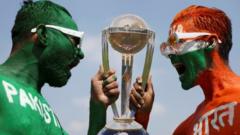The India-Pakistan cricket rivalry, often hailed as one of the greatest in sports, has received renewed scrutiny following Pakistan's latest defeat to India in a Champions Trophy game. A new Netflix documentary titled "The Greatest Rivalry" captures the essence of this fierce contest, featuring perspectives from cricket legends and exploring the cultural ties binding the two nations.
With vibrant displays of patriotism from fans adorned in blue and green, the rivalry transcends mere competition; it is steeped in history and heavy with national pride. As Virender Sehwag aptly notes, "This is a contest bigger than one between the bat and ball," while Waqar Younis declares it ranks supreme among cricket clashes. R. Ashwin emphasizes its importance over the Ashes, highlighting how political tensions only serve to amplify the rivalry's intensity.
However, some question whether this rivalry has lost its once-competitive nature. Pakistan's performance has diminished markedly since their win in the 2017 Champions Trophy final, with India now holding the upper hand, having won six of the last eight ODIs. Commentary from Pakistani media reflects a sense of despair and questions the rivalry's current validity in the absence of closely contested matches. Dawn newspaper expresses doubts, while India Today warns that Pakistan's cricketing identity risks slipping into irrelevance.
Issues related to governance, political instability, and exclusion from lucrative leagues like the IPL have impeded Pakistan's cricketing fortunes. This has generated a sense of marginalization among Pakistani players, as noted by cricket writer Osman Samiuddin. The depths of Pakistan's struggles are illustrated by their recent failures in global events, further nurturing the narrative of their decline.
As fans and pundits reflect on the rivalry's narrative, many agree that the focus has shifted from pure competition to a psychological battle. Cricket writer Gautam Bhattacharyya states, "Pakistan has talent, but the contest now feels more psychological," shedding light on the impact of India's increasing dominance.
Despite the doubts surrounding the sporting rivalry, the commercial attraction remains undeniable. Ticket sales for matches between these nations are still robust, and viewership figures are record-breaking, revealing immense interest among fans. Shubman Gill, India’s vice-captain, dismisses skepticism, asserting the excitement these encounters generate.
As cricket writer Ayaz Memon puts it, though, "the hype is more thrilling than the cricket itself." The outcome of matches may feel predictable, but the allure of this great rivalry endures, driven by passion, history, and the hopes of millions on either side of the border.
With vibrant displays of patriotism from fans adorned in blue and green, the rivalry transcends mere competition; it is steeped in history and heavy with national pride. As Virender Sehwag aptly notes, "This is a contest bigger than one between the bat and ball," while Waqar Younis declares it ranks supreme among cricket clashes. R. Ashwin emphasizes its importance over the Ashes, highlighting how political tensions only serve to amplify the rivalry's intensity.
However, some question whether this rivalry has lost its once-competitive nature. Pakistan's performance has diminished markedly since their win in the 2017 Champions Trophy final, with India now holding the upper hand, having won six of the last eight ODIs. Commentary from Pakistani media reflects a sense of despair and questions the rivalry's current validity in the absence of closely contested matches. Dawn newspaper expresses doubts, while India Today warns that Pakistan's cricketing identity risks slipping into irrelevance.
Issues related to governance, political instability, and exclusion from lucrative leagues like the IPL have impeded Pakistan's cricketing fortunes. This has generated a sense of marginalization among Pakistani players, as noted by cricket writer Osman Samiuddin. The depths of Pakistan's struggles are illustrated by their recent failures in global events, further nurturing the narrative of their decline.
As fans and pundits reflect on the rivalry's narrative, many agree that the focus has shifted from pure competition to a psychological battle. Cricket writer Gautam Bhattacharyya states, "Pakistan has talent, but the contest now feels more psychological," shedding light on the impact of India's increasing dominance.
Despite the doubts surrounding the sporting rivalry, the commercial attraction remains undeniable. Ticket sales for matches between these nations are still robust, and viewership figures are record-breaking, revealing immense interest among fans. Shubman Gill, India’s vice-captain, dismisses skepticism, asserting the excitement these encounters generate.
As cricket writer Ayaz Memon puts it, though, "the hype is more thrilling than the cricket itself." The outcome of matches may feel predictable, but the allure of this great rivalry endures, driven by passion, history, and the hopes of millions on either side of the border.






















